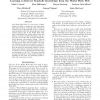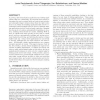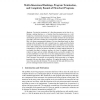156 search results - page 25 / 32 » Automatic Inference of Class Invariants |
129
click to vote
AAAI
1998
15 years 4 months ago
1998
The World Wide Web is a vast source of information accessible to computers, but understandable only to humans. The goal of the research described here is to automatically create a...
149
click to vote
CVPR
2011
IEEE
14 years 11 months ago
2011
IEEE
In this paper we explore the idea of using high-level semantic concepts, also called attributes, to represent human actions from videos and argue that attributes enable the constr...
109
click to vote
MSR
2010
ACM
15 years 8 months ago
2010
ACM
—Free and open source software strongly promotes the reuse of source code. Some open source Java components/libraries are distributed as jar archives only containing the bytecode...
136
click to vote
WMCSA
2012
IEEE
13 years 10 months ago
2012
IEEE
A growing class of smartphone applications are tasking applications that run continuously, process data from sensors to determine the user’s context (such as location) and activ...
120
click to vote
SAS
2010
Springer
15 years 1 months ago
2010
Springer
Abstract. Proving the termination of a flowchart program can be done by exhibiting a ranking function, i.e., a function from the program states to a wellfounded set, which strictl...



